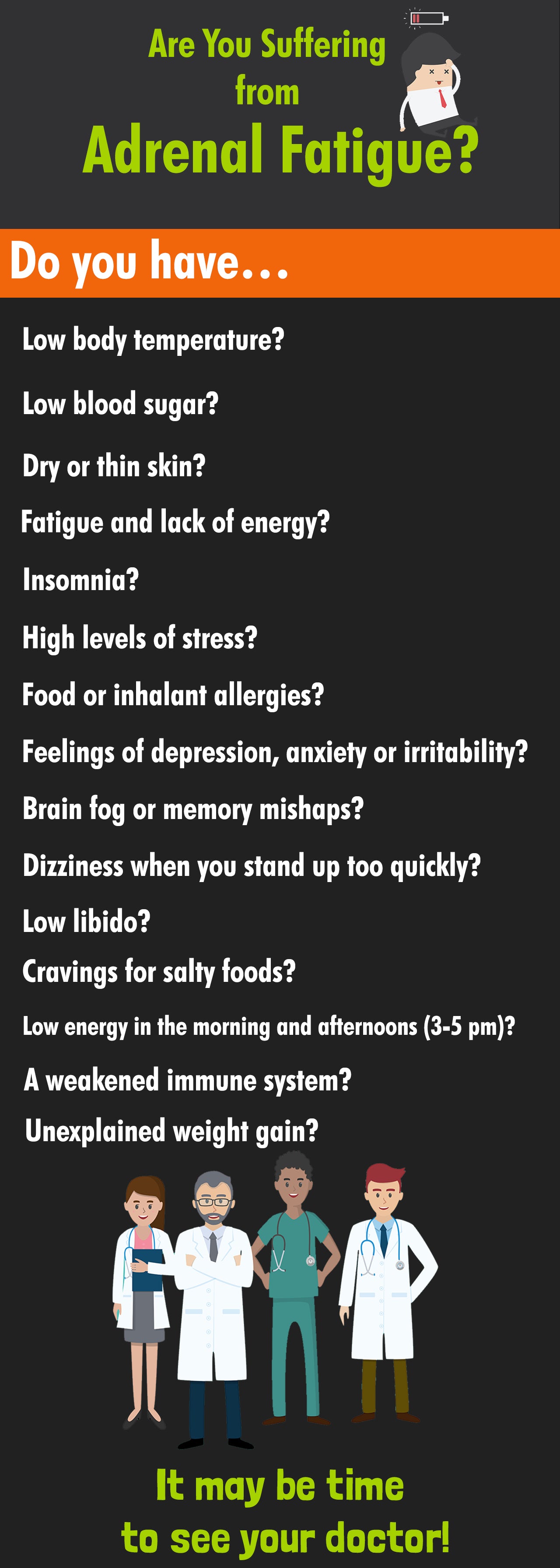How to Recover from Adrenal Fatigue with Amino Acid Adrenal Support
 By: by Amino Science
By: by Amino Science

If you have adrenal fatigue, then you know what a profound impact the condition can have on your quality of life. Not only do adrenal fatigue patients suffer frequent exhaustion, but they also endure anxiety, insomnia, weight gain, and bouts of brain fogginess that affect their ability to work and participate in activities they enjoy. If these symptoms sound familiar, you’re likely wondering how to recover from adrenal fatigue and start living your life optimally again. From lifestyle and dietary changes to the use of supplements such as amino acid adrenal support, there are multiple ways for patients to reverse the effects of adrenal fatigue and boost wellness.
The first step, though, is understanding what causes adrenal fatigue and determining if you could be suffering from the condition.
Understanding Adrenal Fatigue
Although adrenal fatigue has appeared in the medical literature for over 100 years, doctors are just starting to acknowledge the ways in which this condition affects patients’ lives.
According to a 2014 article in Advances in Integrative Medicine, adrenal fatigue is a stress disorder that causes serious fatigue, particularly in the mornings. Sufferers also experience mid-morning energy “lows,” as well as “lows” between 2 pm and 5 pm. Many rebound in the evening, experiencing improved energy after dinner and late at night.
Adrenal fatigue is believed to result from a problem with the adrenal glands. Though small in size, these walnut-shaped organs located above the kidneys contain more than 50 hormones that the body uses to regulate energy levels, respond to stress, and recover from cellular damage, among other vital tasks.
One of the best-known roles these hormones play relates to the fight-or-flight response. When we detect a threat, concrete or abstract, the hypothalamic-pituitary gland signals the adrenal glands to release stress hormones like cortisol, epinephrine, and norepinephrine. This crucial biological response can be life-saving, and, more relevant to most of our daily lives, can allow us to perform our best while exercising, playing sports, dancing, and engaging in other physical activities.
Cortisol, one of the hormones released by the adrenal glands, helps regulate the sleep cycle. Typically, levels rise in the morning to help you wake up, then decline over the course of the day. Individuals with insufficient adrenal function experience low cortisol levels, which can result in symptoms like daytime fatigue and nighttime insomnia.
Over time, patients experiencing chronically high stress levels may develop a problem in which the hypothalamic-pituitary-adrenal (HPA) axis becomes incapable of producing the adrenal hormones and metabolic energy the body needs to function.
These individuals may suffer adrenal exhaustion that can eventually culminate in whole-body burnout. According to an article published in the Journal of Psychosomatic Research, ongoing adrenal stress and glandular dysfunction can result in weight gain, insulin resistance, dyslipidemia (high cholesterol), hypertension (high blood pressure), metabolic syndrome, osteoporosis, increased levels of inflammation, depression, anxiety, fibromyalgia, and chronic fatigue syndrome.
Other signs of adrenal fatigue include:
- Fatigue
- Body aches
- Unexplained changes to your weight (both weight gain and weight loss)
- Low blood pressure
- Lightheadedness
- Loss of body hair
- Skin discoloration

What Causes Adrenal Fatigue?
While there’s no single cause of adrenal insufficiency, the Advances in Integrative Medicine study found that the condition most commonly occurs as a result of chronic or severe stress. The study authors further determined that many adrenal fatigue patients had experienced a traumatic event such as a major motor vehicle accident, divorce, job loss, or emotional trauma.
Researchers have also identified the following lifestyle factors and events as potential adverse influences on natural rest and adaptation cycles that may trigger adrenal fatigue:
- Blood sugar imbalances
- Gut inflammation and food allergies
- Infections
- Autoimmune conditions
- Nutritional deficiencies
The idea that nutritional deficiencies can impact stress and mental health is not a new one. According to a 2008 study in the Indian Journal of Psychiatry, nutritional factors have a significant effect on cognition, behavior, and emotions. Further, researchers have observed that individuals dealing with mental health problems often have the same set of nutritional deficiencies. Deficiencies of the following nutrients are common among individuals seeking treatment for mental health issues: minerals, omega-3 fatty acids, B vitamins, and amino acids.
In light of this research, it’s not surprising that medical professionals are beginning to see the positive effect that amino acids can have on adrenal fatigue.
How Supplements Can Support Adrenal Function
In order to produce the many hormones stored in the adrenal glands, the body requires a steady supply of certain nutrients.
The primary source of nutrients will, of course, be your diet. However, for those experiencing acute or ongoing stress, or who suspect their adrenal function may already be compromised, it can be highly beneficial to provide additional nutrients via targeted supplementation.

1. Vitamin B5
Our bodies need vitamin B5, also known as pantothenic acid, for a variety of reasons. The most important, however, may be the production of Coenzyme A (CoA), an essential cofactor in many central metabolic reactions, such as the utilization of carbohydrates, fats, and proteins as fuel sources. We also need vitamin B5 for the production of hormones including cortisol, estrogen, and testosterone.
It's common for individuals experiencing adrenal fatigue to have depleted levels of vitamin B5 as their bodies strive to generate an adequate supply of cortisol. Providing supplemental B5 can, therefore, help to support healthy adrenal function.
Per a study published in Biological and Pharmaceutical Bulletin, vitamin B5 "stimulates the ability of adrenal cells in male rats to secrete corticosterone and progesterone." In simpler terms, it appears that taking B5 not only helps to restore proper levels of cortisol but also helps rebalance progesterone levels.
2. Vitamin B6
Yet another key player from the B vitamin family, vitamin B6 contributes to the production of serotonin and dopamine, neurotransmitters whose levels dictate our moods, energy levels, and sleep quality.
Researchers believe low levels of vitamin B6 could lead to the development of depression, per a study published in Psychotherapy and Psychosomatics, because vitamin B6 is a cofactor in the tryptophan-serotonin pathway. To investigate this further, the study authors evaluated both vitamin B6 and depression levels for 140 individuals. They found a significant association between low blood levels of vitamin B6 and depression.
Our bodies also require vitamin B6 in order to generate two of the stress hormones (norepinephrine and epinephrine), keep levels of sodium and potassium balanced, promote the maturation of red blood cells, and facilitate oxygen delivery.
3. Vitamin C
Vitamin C, a potent antioxidant, plays a direct role in the production of cortisol in the adrenal cortex. Researchers have found that vitamin C influences blood levels of cortisol and of the stress hormones epinephrine and norepinephrine too.
A study published in the Journal of Interferon & Cytokine Research found that vitamin C supplementation at doses of 500 milligrams a day and 1,500 milligrams a day both produced positive changes to blood levels of cortisol and other cytokines.
Adequate levels of vitamin C also help to ensure healthy immune system function and mitigate the effects of oxidative stress linked to increases in adrenal hormone production.
4. Magnesium
Our bodies run though a large quantity of magnesium every day—approximately 1,000 milligrams for a healthy, active person. When under stress or dealing with an illness or injury, the body needs even more magnesium, around 1,500 to 2,000 milligrams daily.
Unfortunately, scientists from the National Institutes of Health (NIH), a subdivision of the U.S. Department of Health & Human Services, have found that the majority of Americans of all ages fail to meet their recommended daily intake for magnesium. According to an analysis of data from the National Health and Nutrition Examination Survey (NHANES) from 2003–2006, supplements can be a valuable resource for achieving the recommended intake for magnesium.
While it's rare for individuals to actually become deficient in magnesium (the kidneys limit urinary excretion of this mineral), ongoing magnesium inadequacy can have seriously detrimental effects on a person's health, resulting in problems with the metabolism and utilization of proteins and enzymes as well as the production of neurotransmitters and hormones like cortisol, epinephrine, and so on.
Restoring adequate levels of magnesium by taking high-quality supplements can help to prevent or correct health problems such as adrenal fatigue.
5. Probiotics
Given the connection between adrenal fatigue and weight fluctuations, it's hardly surprising that researchers have found clear connections between poor adrenal function and dysbiosis (gut bacteria imbalances). One reason these two conditions often overlap may be that both can stem from chronic stress, environmental and emotional.
Studies, such as this one published in Gut, a monthly peer-reviewed medical journal on gastroenterology and hepatology issued by the British Society of Gastroenterology, show that probiotics can help rebalance the gut microbiome, which in turn has a beneficial effect on the hypothalamic-pituitary-adrenal (HPA) axis. It appears that probiotics target several sites of action, resulting in a long gut–brain neuroimmune reflex pathway.
Those interested in learning more about probiotics can find answers to many common questions in this article.
6. Adaptogenic Herbs
If you're interested in wellness, you've likely come across the word "adaptogen" before. In recent years, this buzzword has become quite ubiquitous. But do you have a good comprehension of what the term truly means?
A good working definition for adaptogenic herbs is that they're nontoxic plants believed to help the body adapt to stressors of all kinds: physical, biological, and even chemical. Adaptogenic herbs and roots have a long history of use in Chinese and Ayurvedic medical disciplines. Each adaptogen has its own list of recommended uses and purported benefits, but they're united by their means of action, which is to restore balance.
Researchers have found a wealth of adaptogenic herbs that can help to counteract adrenal fatigue, including:
- Ashwagandha
- Astragalus
- Cordyceps
- Holy Basil
- Lavender
- Lemon balm
- Maca
- Panax Ginseng
- Rhodiola rosea
- Siberian ginseng (Eleuthero root)
Ashwagandha, lavender, and lemon balm show particular promise as a means of reducing high evening cortisol and adrenaline levels. If you're looking for adrenal support supplements that enhance energy levels and mental clarity, research supports the use of cordyceps, Panax ginseng, and Rhodiola rosea.
Experts typically advise starting with a low dose of an adaptogenic herb and gradually increasing the dose until you feel the desired effects.
7. Licorice Root
Experts in the field of herbal medicine describe licorice root as a true friend to the adrenal cortex. Licorice has been used for ages as a remedy for adrenal insufficiency, and modern scientific analysis shows a strong biochemical basis for that use.
Licorice contains chemicals called triterpenoid saponins that testing reveals can strongly affect the balance between cortisol and cortisone throughout the body. Glycyrrhizin, the main active compound in licorice, can boost levels of cortisol and aldosterone, per a study published in Molecular and Cellular Endocrinology.
Those interested in taking licorice root should consult with a knowledgable medical professional, as high doses have been shown to affect the kidneys and allow cortisol to interact with aldosterone receptors, which can skew the body's sodium-potassium balance and raise blood pressure.
Treating Adrenal Fatigue with Amino Acids
The world leader in amino acid research and product development, The Amino Company, boasts more than three decades of research experience at top universities worldwide. The company’s scientists pride themselves on having performed extensive clinical trials on amino acids and their effects on various health conditions, including adrenal fatigue.
Research shows that amino acid adrenal support could be a crucial component of any restorative program for adrenal fatigue. It appears that incorporating amino acids into the treatment protocol can optimize the dopamine to epinephrine pathway. As levels of these neurotransmitters stabilize, norepinephrine levels and epinephrine levels can follow suit, leading to improved adrenal health.
Although scientists are familiar with more than 300 different amino acids, just 20 are incorporated into body proteins and 9 are considered “essential amino acids” because the body does not synthesize them. By taking dietary supplements of essential amino acids, you can achieve significant health benefits, such as a more adaptive stress response.
Research indicates that essential amino acid supplements can facilitate the normalization of the precursors for the balanced production of brain neurotransmitters, as well as decreasing inflammation and improving muscle function, all of which can help lessen the debilitating effects of adrenal fatigue and restore healthy adrenal function.
Amino Acid Adrenal Support: Which Ones Should You Take?
Researchers have found that some amino acids can be especially useful to treating adrenal fatigue. The following five amino acids can help resolve HPA axis dysfunction and restore optimal adrenal health.
It's important to note that while a specific amino acid may be linked to certain desirable benefits, those benefits can only be achieved when the body has an adequate supply of all the essential amino acids. For this reason, it's better to take a well-formulated essential amino acid supplement containing appropriate ratios of the amino acids relevant to the condition you hope to treat rather than an individual amino acid supplement. You can shop the Amino Co product line here.

1. Tyrosine
Tyrosine, specifically L-tyrosine, serves as a precursor for the production of cortisol, dopamine, norepinephrine, and epinephrine. Individuals experiencing symptoms related to low cortisol, such as difficulty focusing, can benefit greatly from taking a high-quality amino acid supplement containing tyrosine.
If you struggle with symptoms associated with high cortisol, however, supplementing with tyrosine may aggravate those. Anyone who notices increased anxiety, fatigue, or irritability should decrease or discontinue their use of tyrosine.
2. Taurine
This neuroprotective amino acid can improve cell stability. It also has formidable antioxidant properties and can raise levels of an important inhibitory neurotransmitter called gamma-aminobutyric acid (GABA).
The use of supplemental taurine has been shown to result in more balanced moods, elevated calmness, better quality sleep, and a greater ability to relax.
3. Theanine
Researchers have found that theanine exerts a profound influence on your mental state. Theanine can cross the blood-brain barrier and act directly upon neurotransmitters. Per the findings of a study published in Nutritional Neuroscience, "Theanine may inhibit excitatory neurotransmission and cause inhibitory neurotransmission via glycine receptors." Another study on the benefits of theanine found it can bring about a state of relaxed attentiveness by increasing activity in the alpha frequency band.
Overall, theanine modulates activity in the HPA axis in ways that improve sleep quality and decrease stress.
4. 5-Hydroxytryptophan (5-HTP)
5-Hydroxytryptophan, more commonly known as 5-HTP, is the intermediate metabolite of the essential amino acid L-tryptophan and acts as a precursor for serotonin.
Researchers have found that up to 70% of oral doses of 5-HTP reach the bloodstream, and it readily crosses the blood-brain barrier where it can effectively increases central nervous system synthesis of serotonin.
Serotonin contributes to a multitude of vital brain functions, and its levels influence those of norepinephrine and dopamine. Changes to serotonin levels dramatically impact mood and behavior. Serotonin also serves as a precursor for the production of melatonin, a hormone that regulates the sleep-wake cycle. Increased levels of serotonin can improve mood, energy levels, and sleep quality.
If you are currently taking an SSRI-type antidepressant, you should avoid the use of 5-HTP as it also impacts serotonin levels.
5. Phosphatidylserine
Phosphatidylserine, an aminophospholipid and amino acid derivative, occurs naturally in the human body. A large portion of your brain mass is composed of phosphatidylserine. While the body can produce its own, most of our supply of this crucial compound comes from our diets. Yet many experts agree that the modern diet often contains inadequate levels of phosphatidylserine, which can be found in foods such as Atlantic mackerel, chicken heart, soy lecithin, bovine brain, and Atlantic herring.
Researchers have found that this compound can markedly improve hypothalamic-pituitary function. As a key regulator in the HPA axis, it can ensure smooth communication between the brain and the adrenal glands. According to the results of a placebo-controlled study published in the European Journal of Clinical Pharmacology, supplemental phosphatidylserine "may counteract stress-induced activation of the hypothalamic-pituitary-adrenal axis."
The Importance of Seeking Treatment for Adrenal Fatigue
If you’re suffering from adrenal fatigue, it’s important to seek immediate help from a qualified medical professional. Left untreated, an overproduction of adrenal hormones due to stress can have a significant effect on the body.
Because adrenal hormones impact the production of white blood cells, adrenal fatigue can result in a weakened immune system and a reduced ability to fight off foreign invaders. Further, adrenal dysfunction can result in feelings of anxiety, depression, and even panic attacks. Seeking medical attention is the best way to avoid long-term physical and emotional consequences related to your condition.
Not all medical professionals recognize adrenal fatigue as a valid medical condition, so it will be important to find a practitioner experienced in addressing this disorder. While it's always advisable to consult with medical professionals, a complex condition like adrenal fatigue cannot be treated by simply taking a course of prescription pills. Instead, it will likely involve a combination of lifestyle changes and the strategic use of supplements, such as essential amino acid blends formulated to provide adrenal support.

Up to 25% off Amino
Shop NowTAGS: illness
Join the Community
Comments (0)
Most Craveable Recipes




 833-264-6620
833-264-6620



















